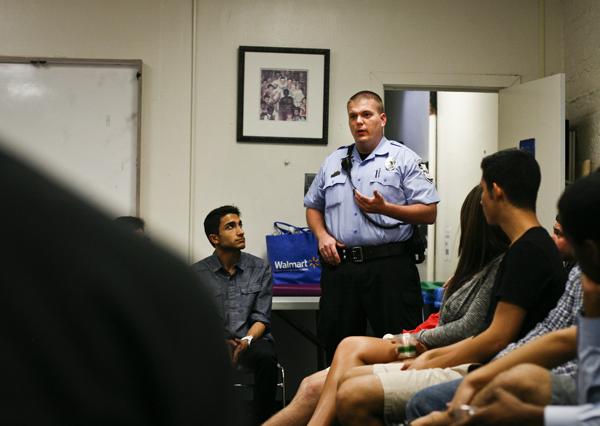University police leaders want students to see officers as more than just badges and squad cars parked outside their residence halls on weekend nights.
About a dozen officers joined a campus-wide program this fall to help break down barriers between uniformed officers and students while spreading awareness about preventing and reporting crimes.
“The whole idea is that we would like the officers to have more contact with the students in positive situations where they get to know them a little bit better,” UPD Chief Kevin Hay said.
The Connect program stresses community policing – a strategy that encourages officers to reach out to students and build a sense of trust before they come to UPD during an emergency. That can range from free self-defense classes in the Multicultural Students Service Center to a spaghetti dinner in a residence hall, with brownies for dessert.
The program replaces a 17-year-old initiative called Adopt-an-Officer, which mostly offered events in residence halls like games of root beer pong at Thurston Hall. While interest waned over time, “there was a common theme of students enjoying conversations and face time with officers,” Suzanne Combs, UPD’s coordinator of victims’ services, said.
Connect officers, donning green pins on their uniforms, have so far teamed up with student organizations like Allied in Pride, the University’s largest gay, lesbian, bisexual and transgender group. Its president, Nick Gumas, said he wanted LGBT students in particular to establish a relationship with officers to create a sense of security.
“All of our members seemed to have great conversations with [the officers] and learned a lot about how the UPD can help them,” Gumas said.
Combs said students who feel more familiar with officers are more likely to report crimes. But she added that crime doesn’t necessarily dominate the dialogue.
“The conversations between students and [officers] do not have to be solely focused on safety. They can include tips on local restaurants or things to do in D.C.,” Combs, who spearheaded the program, said. Officers also talk about “their careers in public service and what it takes to be a first-responder,” she said.
Officer Mark Thunstedt said the officers offer a “very big toolbox” to improve the student experience on campus.
“All have walked away with something – a skill that can save someone’s life, a better understanding of how their campus police can help them, or even a great recipe for pasta sauce,” said Thunstedt, who also helps teach basic life support techniques to the student-volunteer-run EMeRG team.
Connect officers, who are trained to work closely with students, are also responsible for educating House Staff members about alcohol and drug use and theft prevention, as well as giving free self-defense classes.
“We will be visible, we will be out there, we will offer information, and students can either choose to take advantage of it or not,” Hay said.







